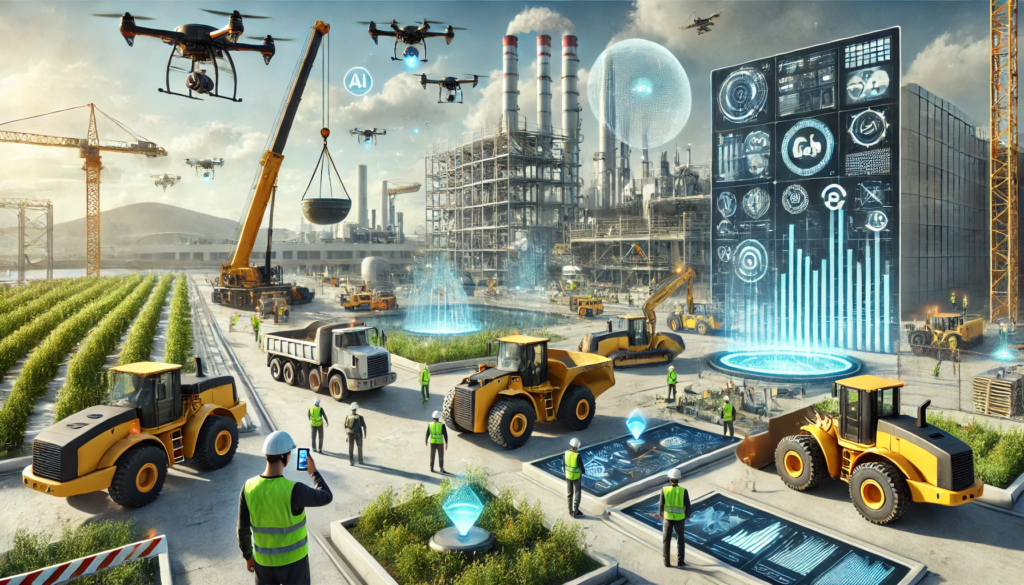The construction industry, often known for its labor-intensive and time-consuming processes, is experiencing a technological revolution, with Artificial Intelligence (AI) leading the charge. The integration of AI in construction is not only reshaping how projects are planned and executed but is also helping firms meet the increasing demand for efficiency, safety, and sustainability. Here’s a closer look at how AI is transforming the construction industry
1. Enhanced Project Planning and Design
AI is being employed to create intelligent designs and optimize project planning processes. Traditional methods rely heavily on human expertise, but AI-powered tools like Building Information Modeling (BIM) take this further by analyzing data to suggest more efficient designs and construction workflows.
AI algorithms can analyze past projects to predict possible challenges, delays, or risks that might arise in future construction plans. Additionally, AI helps to design smart buildings that are energy-efficient and sustainable by simulating different scenarios and optimizing materials and resources.
For instance, generative design, powered by AI, allows architects and engineers to input various parameters such as budget, materials, and environmental conditions to create multiple design iterations quickly. This leads to optimized, cost-effective designs that minimize waste and environmental impact.
2. Improved Safety and Risk Management
Safety is a paramount concern in construction, and AI has the potential to reduce accidents on-site significantly. AI-powered wearable technology, such as smart helmets and vests, can monitor workers’ vitals and detect unsafe behavior or potential hazards. These systems can alert both workers and supervisors to prevent accidents before they occur.
Moreover, AI-powered cameras can continuously monitor the construction site for unsafe conditions, using real-time image recognition to detect hazards like improper use of equipment or lack of personal protective equipment (PPE). Machine learning models can also predict potential risks based on past incident data, allowing project managers to take preventive measures.
3. Automation of Construction Equipment
Autonomous construction equipment such as drones, excavators, and bulldozers are becoming increasingly common. AI-driven machines can perform tasks like excavation, grading, and demolition with a high level of precision, reducing human error and increasing productivity.
Drones equipped with AI can survey construction sites, capturing detailed imagery to create 3D models of the terrain and track progress. These drones can be used to inspect hard-to-reach or dangerous areas, minimizing the need for manual inspections and improving worker safety.
In the future, we may even see fully autonomous construction sites where robots handle most of the heavy lifting, guided by AI systems that optimize their movements and collaboration.
4. Cost Optimization and Resource Management
AI helps construction companies manage their resources more effectively by providing data-driven insights into material usage, equipment operation, and labor deployment. Machine learning algorithms can analyze historical data to predict material needs accurately, preventing over-ordering or under-ordering, which often leads to project delays or budget overruns.
By predicting equipment maintenance needs, AI can help prevent costly breakdowns. Predictive maintenance solutions use AI to monitor the health of construction machinery and suggest when repairs are needed, minimizing downtime and ensuring smooth operations.
AI can also improve workforce management by predicting the optimal number of workers required at different stages of a project, reducing both underutilization and overstaffing.
5. Real-time Monitoring and Predictive Analytics
AI systems are enabling real-time monitoring of construction projects. This helps project managers to have up-to-date information on the progress of the construction work and make adjustments if necessary. Real-time data from drones, sensors, and IoT devices is fed into AI systems, which analyze the data and provide insights to ensure that projects remain on track and within budget.
Predictive analytics, powered by AI, can forecast delays by analyzing factors like weather conditions, material supply chain issues, and labor availability. This allows construction companies to proactively adjust schedules, minimizing downtime and keeping projects on target.
6. Sustainability and Energy Efficiency
The construction industry is increasingly focused on sustainability, and AI can play a vital role in helping companies reduce their carbon footprint. AI can optimize energy consumption in smart buildings by analyzing data from various sensors and adjusting systems like heating, ventilation, and lighting accordingly. This leads to significant energy savings and more environmentally friendly structures.
Moreover, AI can be used to optimize the use of sustainable materials. By analyzing the lifecycle of different materials, AI can recommend eco-friendly alternatives that provide the same level of durability and functionality while minimizing environmental impact.
7. Enhanced Communication and Collaboration
AI-powered tools are improving communication and collaboration across construction teams. Intelligent project management platforms can automatically update stakeholders on progress, track changes, and ensure everyone has access to the most up-to-date project information.
Natural Language Processing (NLP) algorithms can help sift through large amounts of documentation, emails, and contracts to identify critical information, ensuring that important details are not overlooked. These AI systems enable better decision-making by providing teams with the data they need in a digestible format.
Conclusion
The integration of AI in the construction industry is already showing tangible benefits, from improved safety and project efficiency to cost savings and enhanced sustainability. As AI continues to evolve, the construction industry is poised to undergo even greater transformations, driving innovation and setting new standards for the future of building.

